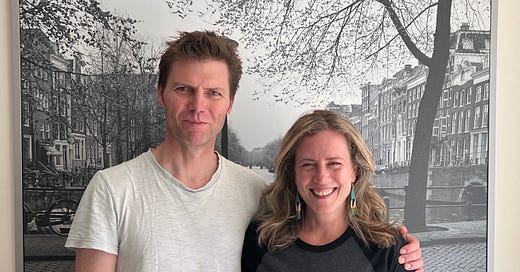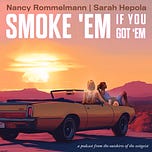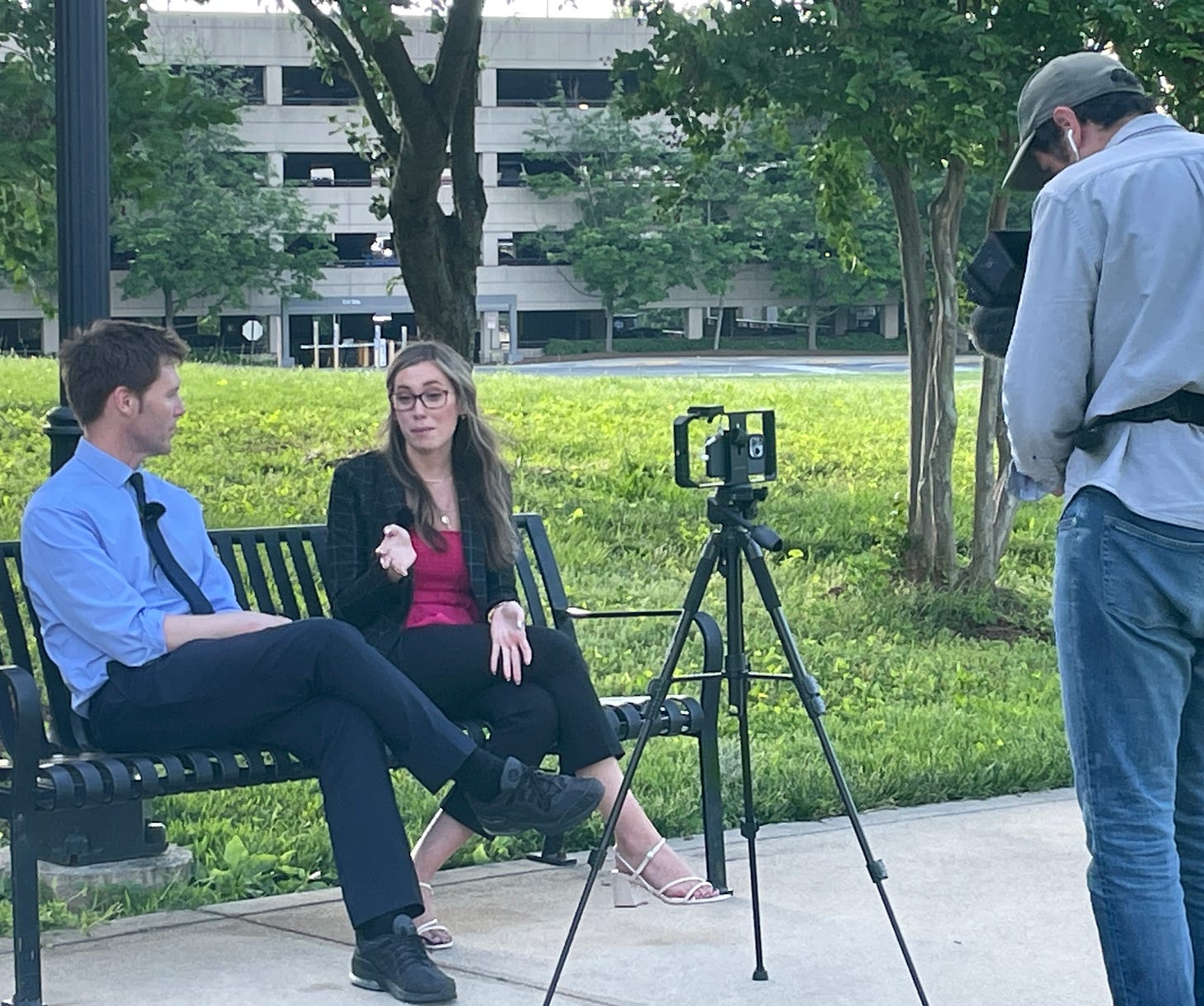by Sarah Hepola
I met Nick Wallis in the cafeteria of the Fairfax, VA, courtroom on my first day. I was still looking for the gaggle of reporters I assumed I’d find, but I was also looking for an outlet. My phone was nearly dead. I asked a reporter tapping away on his laptop in the mostly empty room, and he pulled out his ear buds long enough to politely motion to an outlet beside him. He was in a dapper suit, and he looked so familiar, but I thought maybe I knew him from TV — and then I overheard him chatting with a passerby. That accent!
“This might sound crazy,” I said, leaning over from a nearby table, “but are you Nick Wallis?”
The British are so charming. “Well, yes I am.”
I’d been listening to Wallis’ podcast, Reporting Depp v. Heard, since I’d become obsessed with the cultural, moral, and psychological tangle that is this sordid drama. Legally, Depp v. Heard is a defamation suit in which a tarnished superstar sues his complicated ex-wife over a 2018 op-ed in the Washington Post. But more broadly, it’s a watershed moment in #metoo, the culture of celebrity, and media itself. I went online looking for writers and thinkers who could me piece this puzzle together, and lucky for me, I found Nick Wallis.
Wallis learned his trade at the BBC, and he represents an old-school (and increasingly old-fashioned) way of doing business. He seeks to remain neutral. His questions are fair, curious, well-informed, and tough when they need to be. At a time when choosing sides is a guaranteed way to increase followers, he delights in various perspectives, from the legions of Depp super-fans at the courthouse (who come off as reasonable, for the record) to rare Amber Heard supporters (who describe civil treatment at the courthouse, despite Heard’s grotesque treatment online). In one interview, Wallis introduces us to a therapist working with male victims of domestic abuse, who sees Depp’s testimony as an inspiration. In another, he introduces us to a female barrister who sees the trial as potentially devastating for female victims.
This kind of broad-range journalism is fading in influence. The rise of YouTubers and social media personalities marks a media transformation. Some of the #lawtube commentary has been incisive, comprehensive, fascinating, while the viral videos tend to have all the nuance of an emoji. But for better or worse, most people are experiencing this trial via two-minute story reels and sound bites. Wallis, on the other hand, has witnessed the whole bloody ordeal — and lived to tell the tale.
We met at a DC apartment building where Wallis was staying. We spoke about how the trial in Britain was different, why so few journalists showed up in person, the women growing weary of #metoo, and how this trial will reverberate for decades.
By the way, a British documentarian was filming us as we spoke. She’s been trailing Wallis for a project on the changing nature of journalism. About ten minutes before we wrap, you’ll hear us fumble with an ice machine that kicked on, and because I like to show you the seams (or because I forgot to edit this part), you’ll hear us readjust. I’ll keep you posted on the documentary; it’s a topic of fascination around these parts.
Episode Notes:
Reporting Depp v. Heard: The comprehensive website
“Reporting Depp v. Heard: Introductory Episode” (YouTube)
“I Lost My Virginity to David Bowie,” by Lori Mattix as told to Michael Kaplan (Thrillist)
“What Should We Say About David Bowie and Lori Maddox?,” by Jia Tolentino (Jezebel)
“Amber Heard and the Death of #MeToo,” by Michelle Goldberg (NYT)
“Why It’s Time to Believe Amber Heard,” by Raven Smith (Vogue)
Rolf Harris, Australian/UK entertainer convicted of sexual assault in 2014 (Wiki)
James From Court (Twitter)
“LEAKED Video PROVES Amber Heard is LYING About Her AWFUL Allegations in Australia — She’s DESPICABLE” (Popcorned Planet on YouTube)
















Share this post